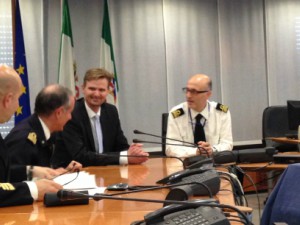ECSA’s Maritime Security Working Group conducted a meeting on 18 May in Rome,hosted by Confitarma, the Italian shipowners’ association, and joined by representatives from the European Commission and Frontex.Migratory challenges remain one of the main security concerns of EU shipowners, as discussed by security experts.
Discussions at the meeting focussed on challenges faced by the merchant fleet due to the migration crisis in the Mediterranean Sea. Mr Vytautas Lukas from Frontex provided statistics that showed very clearly that the impact of the EU-Turkey agreement was immediately felt on the ground, with significant decrease of arrivals from Turkey to Greece. Recently more crossings were witnessed via the longer sea-connection towards Italy from Libya and especially from Egypt.
There is a rise in crossings originating in Libya and Egypt confirmed also the Italian Coast Guard. The ECSA Maritime Security Working Group had the chance to visit the Rome Maritime Rescue Coordination Centre (MRCC). It is the most crucial player in terms of Search and Rescue (SAR) Operations in the Mediterranean Sea close to Libya and in 2015 managed 8 000 emergency calls for more than 930 SAR cases related to migrant flows, saving over 41 000 people.
“We very much appreciate and are impressed by the efforts undertaken by the MRCC and the Italian Coast Guard. The cooperation with shipping companies that are called to assist in SAR operations is very good.We have seen that the efforts from Italy and the entire EU in putting in place operation Triton and other actions in the Mediterranean have eased the pressure on the merchant fleet. The contrast between 2014 when merchant ships were involved in 25.2 percent of SAR operations (882 ships diverted, 284 of these transhipped migrants, saving 41 061 people) to involvement in 11 percent of SAR operations in 2015 (saving 16 158 people) is remarkable. It is hoped that this trend of reduction in the need for assistance by merchant vessels will continue.”Mr Jakob Paaske Larsen, the chairman of the ECSA Maritime Security Working Group, commented
However, all experts fear an increase of crossings in 2016, especially the upcoming months might be challenging with with reduction of arrivals from Turkey to Greece and the Western Balkan route being closed and weather conditions improving.
“Shipowners have the legal obligation to help people in distress at sea and we will continue to live up to this legal and moral duty.However our vessels are neither built nor equipped for these large scale SAR operations, crew is not trained for this and both the migrants and the ship’s crew risk to be endangered as there are security risks, health risks, tensions, physical strain and psychological impact. We strongly stress the need for Member states to ensure continued smooth disembarkation of migrants after a rescue operations.”commented Ms Lieselot Marinus, ECSA’s Trade and Shipping Director.
Source & Image credits:ECSA
































































